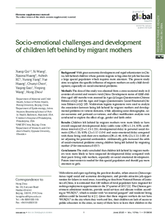Background With great economic development and rapid urbanization in China, left-behind children whose parents migrate to big cities for job has become a large special population which requires more attention. The present study aims to explore the specific influence of migrant mothers on early child development, especially on social-emotional problems.
Methods The data of this study was obtained from a cross-sectional study in 8 counties of central and western rural China. Development status of 1880 children aged <60 months were assessed by Ages & Stages Questionnaire-Chinese Edition (ASQ) and the Ages and Stages Questionnaire: Social Emotional-Chinese Edition (ASQ: SE). Multivariate logistic regressions were used to analyze the association between being left behand by migrant mothers and developmental problems in various domains, while adjusting socio-demographic, socio-economic and perinatal co-variates, and effect modification analysis were conducted to explore the effect of age, gender and birth order.
Results Children left behind by migrant mothers were more likely to have overall suspected developmental delay (odds ratio (OR)=1.24, 95% confidence interval (CI)=1.13-1.35), developmental delay in personal social domain (OR=1.55, 95% CI=1.17-2.04) and socio-emotional delay compared with those living with their own mothers (OR=1.49, 95% CI=1.11-2.00) after adjusting for potential confounders. Additionally, girls increased the odds of social-emotional problems among children being left behind by migrating mother (P for interaction=0.037).
Conclusions The study concluded that children left behind by migrant mothers were more likely to have suspected developmental delay compared with their peers living with mothers, especially on social emotional development. Future intervention is needed for this special population and should pay more attention to girls.

